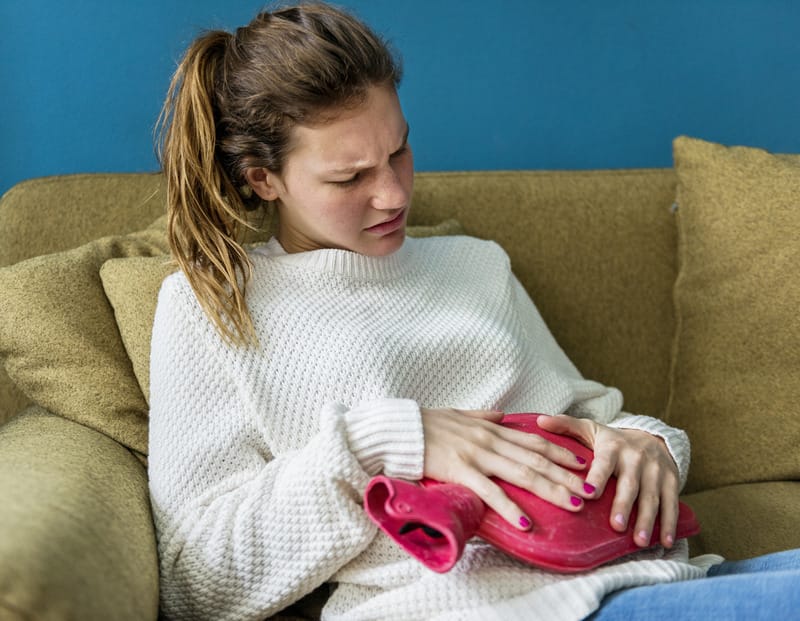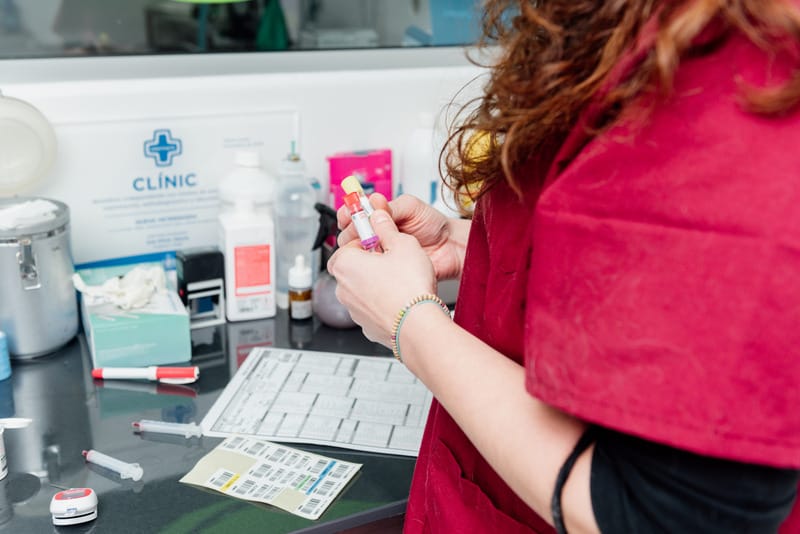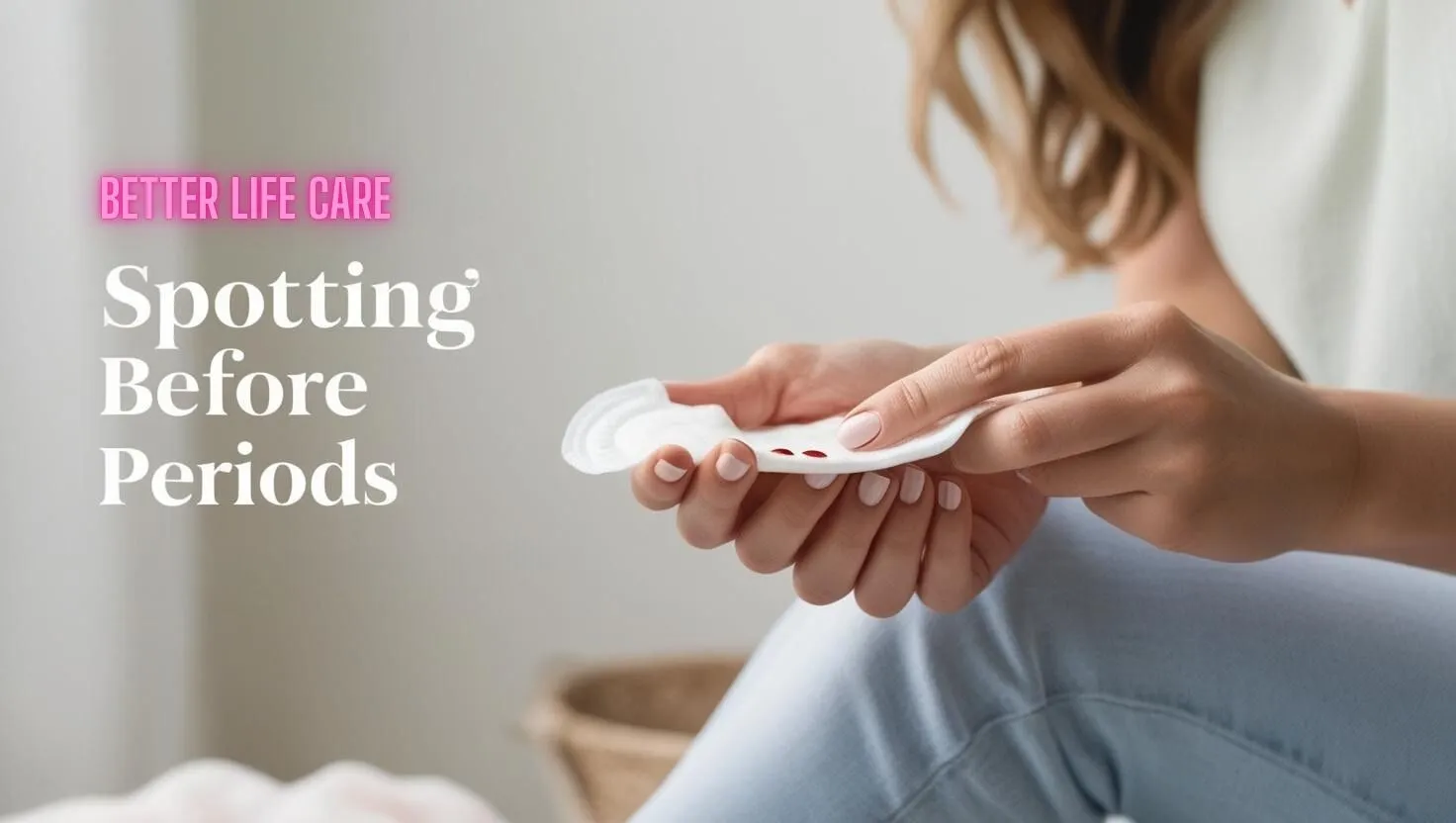It’s common for some women to see spotting before periods, but you should know that this can also be a sign of a health problem such as hormonal imbalance, infection, or a polyp or fibroid.
Knowing what may cause spotting can help women understand if it’s nothing to worry about or something that requires medical attention.
What is Spotting?
Spotting is when you have light bleeding that’s not happening during your period. You may only see slight amounts of blood on your underwear or toilet paper, or the bleeding may last a few days as spotting.
Spotting can happen for several reasons, including hormonal changes, birth control, pregnancy, infection, or polyps or fibroids. Spotting can be normal but can also be a sign of a more serious health issue, so women must remain on top of the changes in their menstrual cycle and get to the doctor if necessary.
Causes of Spotting Before Periods
- Hormonal fluctuations: When you get spotting or light bleeding before your period, changes in hormone levels are to blame.
- Birth control pills: Hormonal contraceptives or IUDs may cause spotting or irregular bleeding.
- Ovulation: Ovulation is the normal release of an egg from the ovary, and spotting can occur with it.
- Polyps or fibroids: Spotting or irregular bleeding could be caused by growths in the uterus (polyps and fibroids).
- Infections: Spotting before periods may be due to some infections, for example, certain sexually transmitted infections (STIs).
- Pregnancy: Implantation bleeding can occur as spotting during early pregnancy.
- Medical conditions: Spotting or irregular bleeding could also be due to certain conditions like thyroid disorders or endometriosis.
- Vaginal Trauma: Vaginal trauma can be a cause of premenstrual spotting as vagina bleeding or spotting can occur as a result of small tears or irritation located on the vagina tissue caused by sexual intercourse, insertion of foreign objects or other rough handling of the vagina area.
- Cervical Cancer: In some cases, cervical cancer can cause spotting before periods, but it is not a common symptom. Bleeding between periods or after sexual intercourse may be a symptom of cervical cancer.
- You have Pelvic Inflammatory Disease (PID): Pelvic inflammatory disease (PID) can be caused when infection of a woman’s reproductive organs occurs from sexually transmitted bacteria and can cause spotting before periods.
However, if spotting before your period happens regularly or comes with other symptoms, it’s important to speak with a healthcare provider to determine the root cause and get proper treatment. Any change in flow or duration of menstrual cycles or pockets can signify the occurrence of spotting before periods.
Symptoms of Spotting Before Periods

Spotting before periods can present with various symptoms, including:
- Light bleeding or spotting: This is the biggest symptom of spotting before periods.
- Cramping: They may also spot and have mild to moderate cramping.
- Changes in cervical mucus: You might find changes in your cervical mucus, amount or consistency.
- Breast tenderness: Breast tenderness or swelling may occur in some women.
- Mood changes: You may feel moody or irritable due to hormone level fluctuations.
- Headaches: Some women may experience headaches or migraines.
- Nausea: In some cases, nausea or vomiting may occur.
- Vaginal discharge: While altered vaginal discharge is not the direct reason for spotting before the period, it can cause so due to related underlying conditions; for this reason, especially if you experience abnormal discharge or spotting, seeing a healthcare professional is advised.
If you’re experiencing persistent or severe symptoms, you should consult a healthcare provider to determine what is causing your disorder and get treatment.
Treatment for Spotting Before Periods
Treatment depends on whether your doctor classifies your spotting as a symptom or sign of an underlying condition because the treatment regimen will vary accordingly.
Treatment options depend on the cause of spotting before your period.
- Hormonal contraceptives: Birth control pills, patches, or hormonal IUDs can help regulate hormone levels and stop the spotting.
- Antibiotics: Your doctor will prescribe antibiotics to treat the infection if the spotting is caused by an infection, like an STI.
- Surgery: Polyps or fibroids may need to be surgically removed in some women to reduce or eliminate bleeding.
- Hormone therapy: If hormonal imbalances cause spotting, your doctor may prescribe hormone therapy to control hormones.
- Lifestyle changes: Making lifestyle changes like reducing stress, getting regular exercise and maintaining a healthy weight will help them regulate hormone levels and reduce spotting.
It is important to identify the cause of spotting before periods and get the right treatment; you need to talk to your healthcare provider to do so.
When to See a Doctor

If you happen to see spotting before your period, it’s also a good idea to be aware of any other symptoms you might be having. It’s a good idea to tell a doctor if the spotting occurs regularly or doesn’t seem to go away.
It is advisable to see a doctor if the number of bleeding from the genitals rises or if there is severe cramping or pelvic pain. And if, in addition to those bladder symptoms, you’re experiencing fever, nausea, or vomiting, you should see your doctor.
When you’re worried about your reproductive health or have a history of abnormal bleeding, it’s especially important to speak to your doctor.
Your healthcare provider can help determine what is causing the spotting and what your best treatment options are. They may also advise on regular check-ups or screening to keep an eye on your reproductive health
Take it seriously if you are suffering from abnormal abdominal pain:

If you’re experiencing abnormal abdominal pain, seek medical attention to find out what’s going on inside of you. Abdominal pain can be caused by several conditions ranging from digestive issues and reproductive system problems to other medical conditions.
Your healthcare provider may want to do tests like blood work, an imaging scan or a physical exam to try to diagnose what’s causing your abdominal pain.
Your treatment options will depend on the condition that is causing your pain, medications, lifestyle changes or even surgery.
Keep an eye out for any extra symptoms that you find, and let your healthcare provider know.
If you develop severe or sudden abdominal pain, fever, vomiting, etc, see your doctor immediately.
What are the reviews of experts on abnormal vaginal bleeding?
Abnormal vaginal bleeding can indicate several underlying health issues, so it is a symptom to be concerned about.
Experts generally agree that if you have any unexplained vaginal bleeding, it should be evaluated by a healthcare provider to find out the cause and what treatment may be necessary.
Abnormal vaginal bleeding is when you bleed between periods or more heavily during periods, or after sex or menopause, and according to the American College of Obstetrics and Gynecologists (ACOG), it is expected to be abnormal.
ACOG recommends complete medical history and physical exam, along with any diagnostic testing (such as ultrasound or blood work) for women with abnormal vaginal bleeding.
Diagnosis of abnormal uterine bleeding:

Diagnosis of abnormal uterine bleeding (AUB) usually includes a healthcare provider’s medical history, physical exam, and diagnostic tests.
They might ask about the menstrual cycle, use of medication and other symptoms. Providers check for abnormalities when they do the physical exam and signs of infection. Additional diagnostic tests, including blood work, imaging scans or uterine lining biopsy, may also be ordered.
Structural issues or growths in the uterus may be checked for by doing imaging tests, such as an ultrasound or MRI. A biopsy is the removal of a small amount of tissue from the uterine lining to check for abnormal cells or cancer.
Depending on the cause, treatment for AUB includes medications, such as hormonal birth control or NSAIDs, and procedures, such as endometrial ablation or hysterectomy. The best treatment plan is agreed on by healthcare providers with patients working under their individual needs and health status.
Some other reasons why you are spotting before periods:
- The decline in estrogen: In women, symptoms such as hot flashes and irregular periods result from reduced estrogen levels.
- Stress: Mental or emotional strain or physical strain that can reflect on the health generally or on menstrual cycles.
- Anticoagulant drugs: Increased bleeding or spotting in the form of spotting may occur when medications used to prevent blood clotting are taken which are also known as anticoagulants.
- Cervical erosion: A benign condition in which the cells from the cervical canal migrate to the outer cervix, causing discharge or spotting.
- Abortion: Spotting or bleeding may occur from terminating a pregnancy, medically or surgically.
- PCOS: Polycystic ovary syndrome (PCOS) is a hormonal disorder characterized by irregular periods, hormonal imbalances and enlarged ovaries marked by numerous small cysts.
- Cervicitis: Pain, discharge or abnormal bleeding caused by inflammation or infection of the cervix.
- Adenomyosis: Pain/bleeding results when the tissue of the uterus lining grows into the muscular wall of the uterus.
- Vaginal dryness: A vagina that lacks natural lubrication and may feel dry, causing discomfort or a feeling of itching or pain.
- Urethral prolapse: The lining of the urethra is protruding from the urethral opening and is uncomfortable and bleeds.
- Low thyroid levels: An underactive thyroid gland, hypothyroidism, leads to fatigue, weight gain and menstrual irregularities.
- Pregnancy loss: Spotting/bleeding can occur from miscarriage or stillbirth (loss of a pregnancy).
Scientific knowledge

As we mentioned earlier, spotting before periods happens when you have light bleeding or spotting before your period is supposed to begin. It is what the medical community calls ‘intermenstrual bleeding’ or ‘metrorrhagia.’
Spotting before periods is usually caused by hormonal imbalances, ovulation, polyps or fibroids in the uterus, infections, thyroid issues, medications, or pregnancy.
For instance, hormonal imbalances, specifically with estrogen and progesterone fluctuation, result in irregular bleeding and spotting. Spotting also can occur around the time of ovulation, when the ovary releases an egg. Abnormal bleeding and spotting can also result from polyps or fibroids in the uterus, infections or thyroid issues.
Lastly, abnormal bleeding and spotting may occur if you are taking some medications, such as blood thinners. If you’re spotting before periods, it’s important to consult with a healthcare provider so they can look into the root of the issue and offer proper treatment.
Your healthcare provider may suggest hormonal therapy, medication, or other treatment to better manage your symptoms, depending on your diagnosis.
Some Home Remedies

Although there are no substitutes for medical treatment for spotting before the period, a few home remedies could be a relief for it. Here are a few remedies to consider:
- Maintain a healthy lifestyle: A balanced diet and regular exercise can help regulate hormonal imbalances that can cause spotting before periods, and reducing stress levels can also help.
- Herbal remedies: Some herbs, like ginger, turmeric, and cinnamon, may have an anti-inflammatory and antispasmodic action, which can help make menstrual cramps less or help regulate menstrual bleeding.
- Heat therapy: Cramps and bleeding can be lessened by applying heat to the lower abdomen. Rub a heating pad or take a warm bath to relax the muscles.
- Vitamin supplements: Blood clotting can be improved by taking supplements such as vitamin C and vitamin K, which also help to lower bleeding.
- Probiotics: Having a healthy gut microbiome helps reproductive health, and taking probiotics can help promote it.
Nevertheless, if you want to try home remedies, you should speak to a health provider before attempting to use one, as they may not work for everyone. If spotting before periods is persistent or heavy and you don’t seem to be pregnant, check with your doctor to be treated and determine the cause.
Conclusion
Spotting can be normal, or it can be a sign of an underlying health problem. It may be caused by hormonal fluctuations, birth control, polyps or fibroids, infections, pregnancy, or medical conditions.
Common symptoms include light bleeding, cramps, changes in the cervical mucous, breast tenderness, mood swings, headaches, and nausea. Its treatment is dependent on the underlying cause of it and may include hormonal contraceptives, antibiotics, surgery, hormone therapy, or lifestyle changes.
Home remedies include maintaining a healthy lifestyle, use of herbal remedies, heat therapy, vitamin supplements, and probiotics. Still, it’s important to see a healthcare provider to determine the underlying cause and receive treatment.
FAQs

What If Spotting Occurs a Week Before My Period?
A week before your period, you have a reason to worry, as spotting can be a sign of a health problem.
Light bleeding outside of a woman’s usual menstrual cycle, caused by a number of factors, is also referred to as spotting.
Spotting a week before your period can also be from changes in hormones – which sometimes come from a drop in the estrogen levels, causing the lining of the uterus to shed and create spots.
For example, spotting could mean the onset of more severe conditions like uterine fibroids, polyps or endometriosis.
Uterine fibroids are benign growths that occur in the uterus; polyps are small, noncancerous growths that can develop on the lining of the uterus.
The tissue that lines your uterus grows where it should not, outside of your uterus, and this can give rise to endometriosis, which can then give rise to pain and other symptoms.
Could Hormonal Birth Control be the reason?
Before periods, spotting is a risk of taking hormonal birth control since it affects hormones in your body, which may have led to your periods not being regulated.
It’s more common in those first few months after beginning a new form of hormonal birth control or switching from one type to another.
If you have spotting before your period on hormonal birth control, it’s crucial to speak with your healthcare provider. Sometimes, they may recommend changing the amount of medication you take or suggesting you try a different type of birth control to lessen the spotting.
Bear in mind, though, that other side effects of hormonal birth control are possible, so be sure to talk with your healthcare provider about any concerns or questions you might have.
Is understanding Spotting Timelines important?
There are a number of reasons why it’s important to understand spotting timelines. It makes it possible for you to tell patterns of when you are having your periods and can allow you to detect any irregularities as you try to conceive or when you are concerned about your reproductive health.
Also, being aware of spotting timelines can benefit you by helping you differentiate spotting from other types of bleeding.
For example, implantation bleeding, which many mistake for spotting or an early period, usually happens about 6–12 days post-conception. When the proper timing of different types of bleeding is understood, it is possible to distinguish between them.
Finally, while not everyone may need to spot timelines, it is a great way to track your menstrual health and pick up any potential problems.
It is, therefore, important that we know about spotting timelines to be able to manage our menstrual health properly.
How many days of spotting before your period is normal?
The number of days of spotting before your period that are considered normal can vary depending on the individual. However, typically spotting a few days before your period is not uncommon and can be caused by hormonal changes.
Consulting with your healthcare provider is crucial to rule out any underlying health issues if you experience spotting for an extended period or have other symptoms. It’s also important to note that some women may experience spotting throughout their menstrual cycle, while others may not experience any spotting at all.
What if you have Uterine Fibroids?
If someone has uterine fibroids, healthcare providers may recommend various treatment options based on factors such as the size, number, and location of the fibroids, as well as the patient’s overall health and desire for future fertility.
Some treatment options include medication to manage symptoms, non-invasive procedures to shrink or destroy fibroids, and surgery in cases where fibroids are severe or impacting fertility.
Alleviating symptoms like heavy bleeding and pelvic pain can be achieved with medications such as hormonal birth control or gonadotropin-releasing hormone (GnRH) agonists.
Reducing fibroid size or destroying them without surgery can be achieved through non-invasive procedures such as uterine artery embolization or magnetic resonance-guided focused ultrasound.
If fibroids are causing severe symptoms or infertility, surgery may be necessary. This could involve a myomectomy, which involves removing the fibroids while leaving the uterus intact.
What if you are experiencing ovulation spotting?
Experiencing ovulation spotting is normal for some people and does not usually warrant concern. Ovulation spotting is caused by a small amount of bleeding when the egg is released or hormonal changes in the body.
However, seeking medical attention is important if you experience heavy bleeding, severe pain, or other symptoms along with ovulation spotting. Tracking ovulation spotting can also be useful when trying to conceive as it can help determine your most fertile days.
What is the common cause of spotting before the period?
The most common reason for spotting before periods is related to hormonal fluctuations or imbalances that happen during ovulation or when you change your birth control. Other causes are stress, infections or underlying medical conditions. If you have spotting consistently then consulting with a healthcare professional to evaluate and have it treated appropriately is critical.
How can I stop spotting before my period naturally?
To reduce the likelihood of spotting before your period naturally, consider the following lifestyle changes:
Maintain a healthy weight:
Manage stress:
Track your cycle:
Avoid excessive exercise:
Limit caffeine and alcohol intake:
Stay hydrated:
Nutritional supplements:
These suggestions will work for some people, but remember, if you are spotting, there is likely an underlying cause that these steps may not address. If spotting continues or gets worse, it is important to see a healthcare professional to determine the source and to be treated appropriately.
What is the main reason for spotting?
The reason for spotting can be different, but often, it’s caused by hormonal fluctuations or hormonal changes in the menstrual cycle.
Other causes, however, may include infections or stress or may arise from underlying medical conditions. Seek evaluation and proper treatment from a healthcare professional, as they can help to identify the reason for your spotting.
What problems cause spotting?
The cause of spotting is most often hormonal fluctuations resulting from ovulation, birth control, or hormone imbalances. Spotting can also occur if you are under emotional or physical stress.
Abnormal bleeding can be caused by infections, such as vaginal, cervical, or pelvic infections, such as bacterial vaginosis and sexually transmitted infections.
Spotting can also occur when you have cervical issues like polyps or erosion. Endometriosis (uterine lining tissue in the wrong place outside the uterus, like in the ovaries) and adenomyosis (uterine lining in the wall of the uterus itself) may be the cause of your painful periods and spotting. Hormonal imbalances and irregular periods are also a result of spotting due to a hormonal disorder called Polycystic Ovary Syndrome (PCOS).
Heavy periods or spotting can be caused by uterine fibroids, which are growths in the uterus that are not cancerous. Spotting can also indicate pregnancy problems, such as implantation bleeding, an ectopic pregnancy or miscarriage. Finally, abnormal bleeding may be brought by some medications, including anticoagulants or hormonal therapies.
If you get regular spotting, it is important to consult a healthcare professional for an accurate diagnosis and appropriate treatment.
What are the problems of spotting?
As with most conditions, there can be different problems resulting from the root cause for spotting. Some potential problems linked to spotting include:
Inaccurate tracking of menstrual cycles: The problem with spotting is that it can make it hard to actually track your menstrual cycle, which means it can impair your ability to plan for conception or use birth control at the proper time.
Emotional distress: Frequent or unexpected bleeding can be emotionally distressing, embarrassing, or anxiety-inducing, affecting one’s daily life and personal relationships.
Indicator of underlying health issues: However, spotting together with other symptoms may indicate an underlying health issue, for example, hormonal imbalances, certain infections or gynecological conditions (for example, endometriosis, adenomyosis, uterine fibroids).
Pregnancy complications: Spotting during pregnancy in some cases, may signal a miscarriage, an ectopic pregnancy or other pregnancy complications that will need medical attention.
Anaemia: Prolonged or heavy spotting can cause blood loss and anemia when you don’t have enough red blood cells to carry oxygen to your tissue. In case you have regular spotting.
An accurate diagnosis by a healthcare professional as soon as possible is needed to address any potential problems or complications and get proper treatment.


